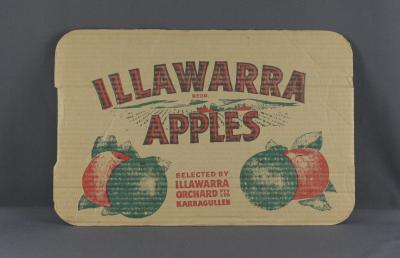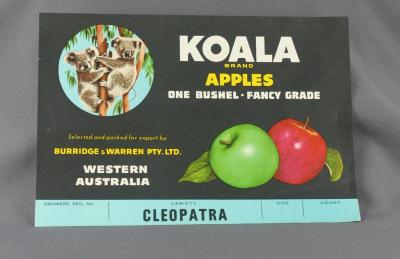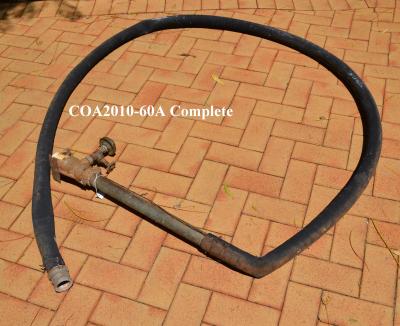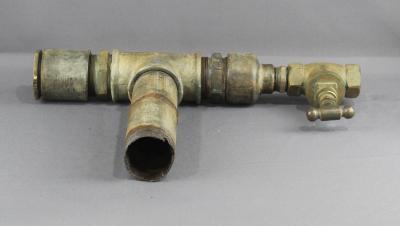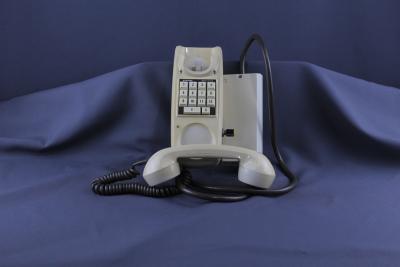FRUIT BOX LABEL APPLES GRANNY SMITH - ILLAWARRA ORCHARD
1916 - 1959Rectangular piece of paper, yellow background with a thin black border in from the edge.
There is a circular panel with the image of a kookaburra on a branch surrounded by four apples and a white annular area with blue text [GROWN & PACKED BY ILLAWARRA ORCHARD LTD. KARRAGULLEN]. The text below the circular panel is [WESTERN AUSTRALIAN / APPLES / ONE BUSHEL NETT / GRANNY SMITH / STANDARD 23/4] in black colour.
A unused fruit box label from Illawarra Orchard used to identify their fruit which was then exported to overseas markets.
The land that the orchard was established on was first purchased by Edward Keane in 1891, and sold shortly afterward to Edward Wharton White and Lionel White (the manager of the Canning Mills), and E.H. Dean Smith (a well-known Perth architect). Situated at about 1,000 feet above sea level, it is one of the most elevated orchards in the State. In 1893, clearing and planting began, Lionel White laying out the initial 12 acres of ?Illawarra?(named after the Whites family home at Kapunda, South Australia) with an orchardist from Mundaring, Mr. Laufer, planted the first trees.
In 1899, Thomas Price moved with his wife Emily Claudia Price (nee Rogers) to Karragullen to become manager/partner of the IllawarraOrchard, relocating from the fruit tree nursery and orchard he managed at Guildford for Charles Harper. Price had been born (in 1864) and educated in Shropshire, after which he studied horticulture with a large firm of London nurserymen. In 1891, he migrated to Western Australia, and settled in Guildford.
Around 1900, there were 32 varieties of apples planted at Illawarra, as well as many varieties of pears. The five main varieties of apples were Dohertys (or Improved Yates), Jonathons, Cleopatras, Dunns Seedlings, and Rokewoods, while in pears, the Bartlett was the most important, followed by Gansels Bergamot. In addition, there were numerous varieties of stone and citrus fruits, quinces and persimmons. By 1902, there were 44 acres of fruit trees at Illawarra, the majority apples. By 1912, the property comprised 228 acres, of which 50 acres had been brought under cultivation. The annual output in that year had reached 10,000 cases of apples and pears.
The Granny Smith Apple was developed in New South Wales in 1868 but it was not until the 1890s that it started to gain some popularity. Its popularity was driven by its taste and its long shelf life. In 1911-12 Thomas Price planted Granny Smiths at Ilawarra for the first time eventually replacing all of his Rokewood Apple trees with Granny Smith trees. The first shipment of these apples was exported in 1922.
Source Heritage Council of WA assesment of Illawarra Orchard
Details
Details
This object is part of a collection that represents the important role Agricultural and Horticultural Societies have played in the supporting, promotion and development of rural industries in the City of Armadale as well as providing significant social events that brought large parts of the community together to celebrate the achievements of local families, orchards, farmers and horticultural. Agricultural and horticultural societies have operated in the City of Armadale since 1897 when the Kelmscott Agricultural Society was formed.
City of Armadale - History House
City of Armadale - History House
More items like this
Other items from City of Armadale - History House
- FRUIT BOX LABEL APPLES -WESTERN AUSTRALIAN APPLES
- CAMP BED
- HOSE, IRRIGATION HOSE - WITH SPRINKLER ATTACHMENT
- PIPE, IRRIGATION - JUNCTION SECTION
- PIPE, IRRIGATION - PLAIN THREADED
- PIPE, IRRIGATION PIPE - FITTINGS
- PIPE, IRRIGATION - TAP
- BROCHURE, SALES - ARMADALE SHOPPING CENTRAL
- RADIO-TELEPHONE, TWO-WAY
- CLAY BRICK - ARMADALE
- BOX FOR COMMODORE 64 COMPUTER
- SHEATH FOR BOX FOR COMMODORE 64 COMPUTER
